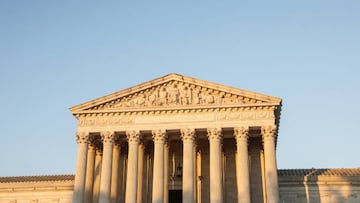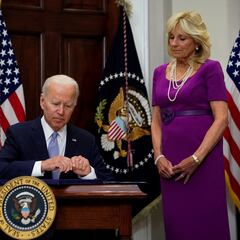What can states do to limit access to guns after the Supreme Court’s decision about gun control in New York?
The ruling prevents states from banning concealed weapons in public places, but California and New York are already drafting new gun control legislation.


For the first time, the Supreme Court has ruled that the United States Constitution specifically protects an individual’s right to carry a handgun in public for self-defence. The ruling was made public on Thursday, a significant victory for gun rights advocates across the country.
The 6-3 decision came in response to a law introduced in New York State that would have imposed restrictions on carrying a concealed handgun outside the home. All six conservative Justices supported the decision, while the three liberal members of the Court dissented.
The ruling, authored by Justice Clarence Thomas, reads: “We know of no other constitutional right that an individual may exercise only after demonstrating to government officers some special need.”
New York looks to curb gun violence
Thursday’s ruling was a major blow for New York Governor Kathy Hochul, who described the decision as “very disturbing”. However she reiterated her desire to see new restrictions placed on gun ownership and revealed that the state was already looking into legislative alternatives to the law that has been struck down.
New York Gov. Kathy Hochul has called an extraordinary session of the state's legislature to pass additional gun control measures in light of the Supreme Court's gun ruling.
— Kyle Griffin (@kylegriffin1) June 25, 2022
New York City Mayor Eric Adams said that the ruling makes it more difficult to regulate guns in the US and prevents progress being made in the field of gun violence. Adams, a former police captain, is desperate to introduce significant change in a city that has seen 693 shootings already this year.
“This decision has made every single one of us less safe from gun violence,” he said at a news conference. “The decision ignores the shocking crisis of gun violence every day, engulfing not only New York but engulfing our entire country.”
What can states do to enact gun control laws now?
Likewise in California, another Democrat-led state, further efforts are being made to introduce laws that satisfy the Court’s ruling. A recent law proposed in California would have required those seeking a gun permit to show “good cause” before receiving their license; a condition that would now be unconstitutional.
However California Attorney General Rob Bonta said that “the court did not disturb California’s longstanding efforts to prevent dangerous individuals from attaining these permits.”
California’s gun laws are widely viewed as some of the strictest in the country by advocates on both sides of the gun-control debate.
— Los Angeles Times (@latimes) June 23, 2022
But a new Supreme Court ruling puts a number of those laws on shaky constitutional ground.https://t.co/RG4LSJ6VGx pic.twitter.com/4QxCuPhJyt
Related stories
New gun control legislation proposed in anticipation of the Supreme Court ruling can now be tweaked so that it satisfies the conditions set down. One of the key points made in the Court’s verdict was to allow certain “sensitive places” to have additional layers of gun control laws, as is already the case in schools and government buildings.
Speaking about the process to rewrite gun control laws with the recent ruling in mind, Bonta said: “The assessment is going to be robust, including looking at arrests, convictions, restraining orders, and other publicly available information that might suggest that a person poses a danger to themselves or to others.”

